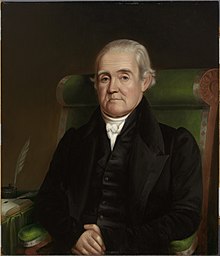Noah Webster | |
|---|---|
 An 1833 portrait of Webster by James Herring | |
| Member of the Connecticut House of Representatives | |
| In office 1800; 1802 – 1807 | |
| Personal details | |
| Born | Noah Webster Jr. October 16, 1758 Western Division of Hartford,[1][2] Connecticut Colony, British America |
| Died | May 28, 1843 (aged 84) New Haven, Connecticut, U.S. |
| Resting place | Grove Street Cemetery |
| Political party | Federalist |
| Spouse |
Rebecca Greenleaf Webster
(m. 1789) |
| Children | 8 |
| Alma mater | Yale College |
| Occupation |
|
| Military service | |
| Allegiance | United States |
| Branch/service | Connecticut Militia |
| Battles/wars | American Revolutionary War |


Noah Webster (October 16, 1758 – May 28, 1843) was an American lexicographer, textbook pioneer, English-language spelling reformer, political writer, editor, and author. He has been called the "Father of American Scholarship and Education". His "Blue-Backed Speller" books taught generations of American children how to spell and read. Webster's name has become synonymous with "dictionary" in the United States, especially the modern Merriam-Webster dictionary that was first published in 1828 as An American Dictionary of the English Language.
Born in West Hartford, Connecticut, Webster graduated from Yale College in 1778. He passed the bar examination after studying law under Oliver Ellsworth and others, but was unable to find work as a lawyer. He found some financial success by opening a private school and writing a series of educational books, including the "Blue-Backed Speller". A strong supporter of the American Revolution and the ratification of the United States Constitution, Webster later criticized American society as being in need of an intellectual foundation. He believed American nationalism had distinctive qualities that differed from European values.[3]
In 1793, Alexander Hamilton recruited Webster to move to New York City and become an editor for a Federalist Party newspaper. He became a prolific author, publishing newspaper articles, political essays, and textbooks. He returned to Connecticut in 1798 and served in the Connecticut House of Representatives. Webster founded the Connecticut Society for the Abolition of Slavery in 1791[4] but later became somewhat disillusioned with the abolitionist movement.[5]
In 1806, Webster published his first dictionary, A Compendious Dictionary of the English Language. The following year, he started working on an expanded and comprehensive dictionary, finally publishing it in 1828. He was influential in popularizing certain American spellings. He played a role in advocating for copyright reform, contributing to the Copyright Act of 1831, the first major statutory revision of U.S. copyright law. While working on a second volume of his dictionary, Webster died in 1843, and the rights to the dictionary were acquired by George and Charles Merriam.
- ^ Dobbs, Christopher. "Noah Webster and the Dream of a Common Language". Noah Webster and the Dream of a Common Language. Connecticut Humanities. Retrieved July 24, 2015.
- ^ "Connecticut Births and Christenings, 1649–1906". FamilySearch. Retrieved July 24, 2015.
- ^ American Reformers: Early/Mid 1800s: Noah Webster. "[1] Archived November 26, 2017, at the Wayback Machine" accessed July 31, 2019.
- ^ "The Abolitionist Movement » Farmington Historical Society". Retrieved October 24, 2024.
- ^ "Author Search Results". catalog.library.tamu.edu. Retrieved November 7, 2024.